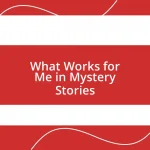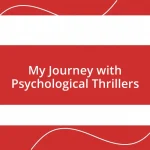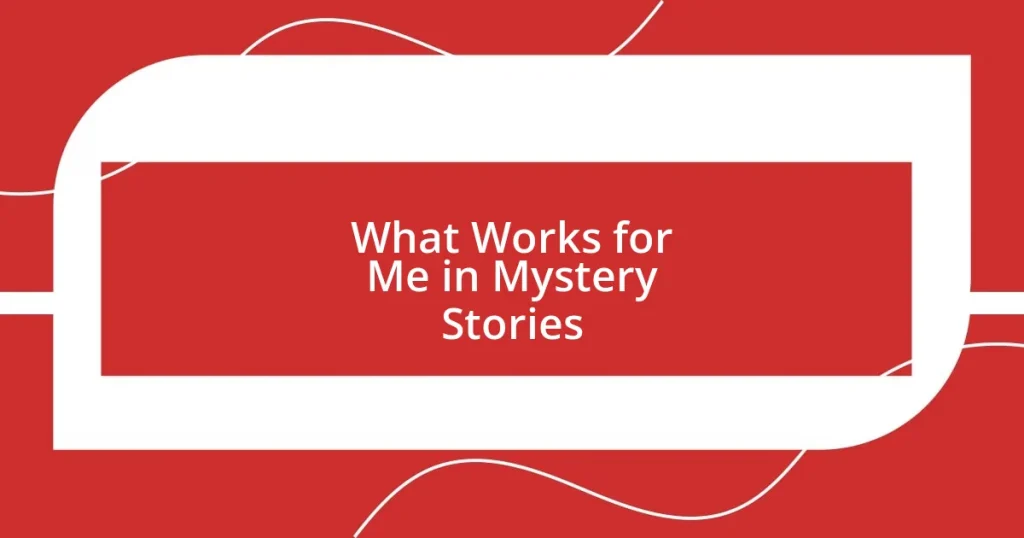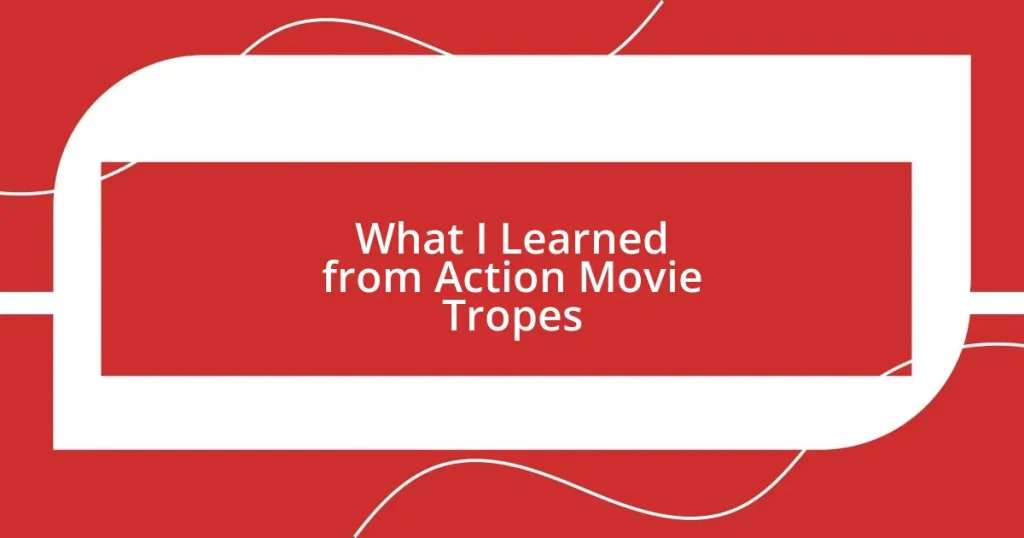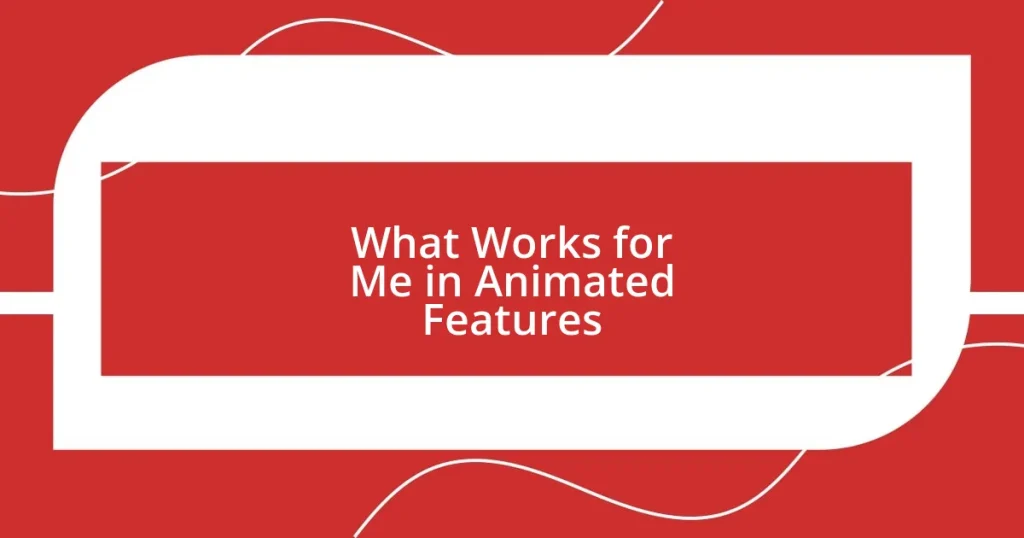Key takeaways:
- Unexpected movie endings challenge perceptions, evoke strong emotions, and encourage deeper engagement with the narrative.
- Different types of unexpected endings include twist endings, open conclusions, and character reversals, each creating unique impacts on viewers.
- Ambiguity in endings can reflect life’s uncertainties, prompting personal reflections and insights beyond the film itself.
- Films like “Fight Club” and “Gone Girl” illustrate how shocking conclusions reshape character understanding and moral dilemmas.
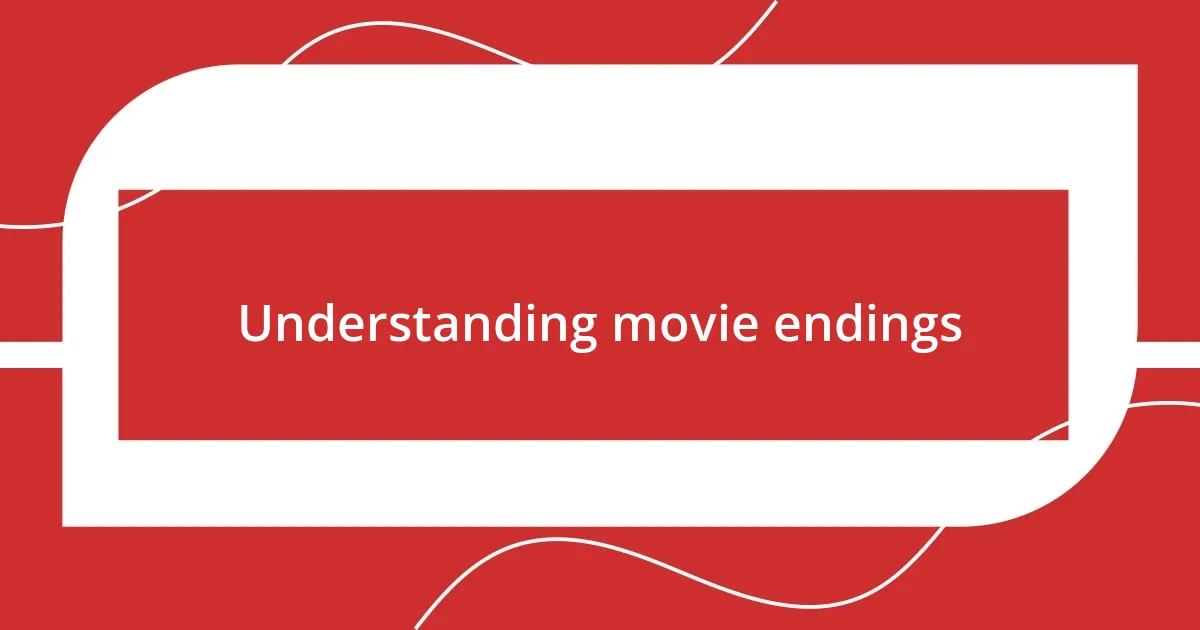
Understanding movie endings
Movie endings can often leave us with more questions than answers, which is part of their magic. I remember watching “Inception” for the first time, and as the credits rolled, I found myself grappling with whether Cobb was still dreaming. Isn’t it fascinating how a single scene can spark endless debates and personal reflections?
The beauty of an unexpected ending lies in its ability to challenge our perceptions. For instance, I’ll never forget the twist in “The Sixth Sense.” That moment redefined everything I thought I understood about the story and its characters. It’s a powerful reminder of how storytelling can play with our emotions and expectations.
Unexpected endings often evoke strong reactions, from satisfaction to confusion. After seeing “Shutter Island,” I sat in stunned silence, pondering the main character’s fate. Have you felt that mix of excitement and frustration when a film takes a bold turn? It’s moments like these that make cinema such a compelling and sometimes polarizing experience.

Types of unexpected endings
Unexpected endings can be categorized into several distinct types, each evoking its own unique impact on viewers. For me, one of the most electrifying types is the twist ending, where what we thought we knew suddenly flips on its head. I recall watching “Fight Club,” where the big reveal not only shocked me but made me question the very nature of reality itself. The emotional punch was so intense that I felt compelled to rewatch the film immediately, eager to catch the clues I had missed the first time around.
Here are some other fascinating types of unexpected endings:
- Open-ended conclusions: These leave vital questions unanswered, prompting viewers to interpret the story in their own way.
- Character reversals: When a protagonist shows their true colors, it shatters our preconceived notions, much like the character arc in “Gone Girl.”
- Unreliable narrators: Stories told through a deceptive lens can lead to a shocking denouement, just like the captivating journey in “The Usual Suspects.”
- Sudden tonal shifts: Films that pivot dramatically from light to dark can leave us stunned, as I felt during “The Cabin in the Woods.”
- Circular storytelling: This technique, as seen in “Memento,” leaves audiences feeling trapped in a loop, fascinated by the intricate narrative structure.
Each type carries its weight, creating a tapestry of experiences that linger long after the credits roll.
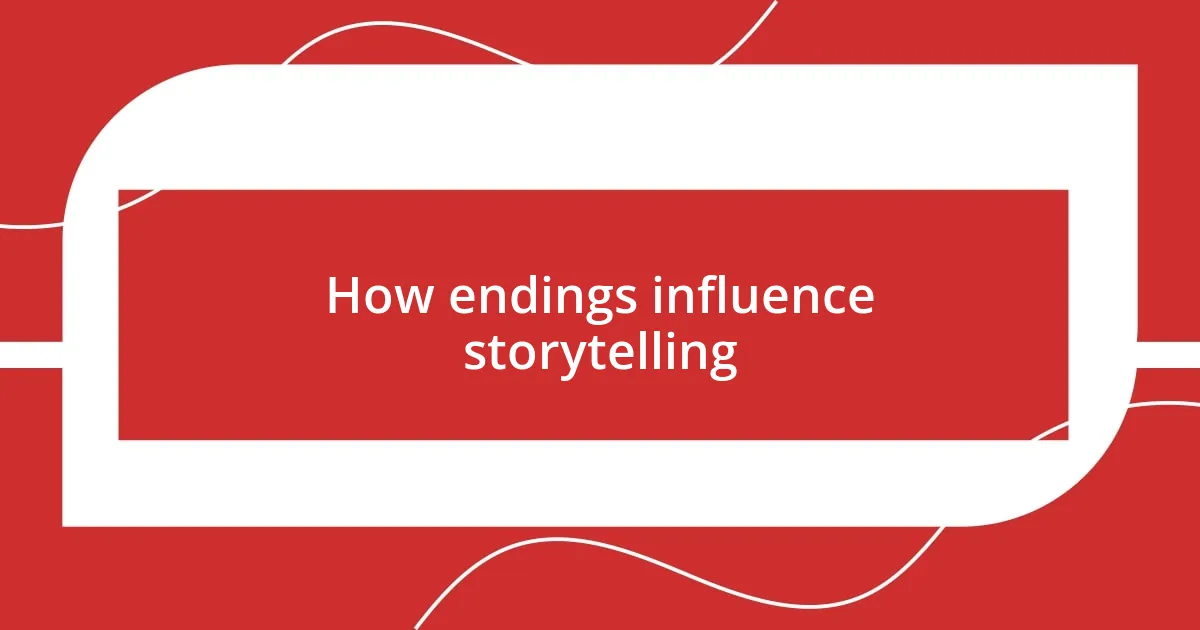
How endings influence storytelling
Unexpected movie endings play a pivotal role in shaping the entire narrative. For me, endings often reveal the true intent of the story, reshaping our understanding of the characters’ journeys. Take “The Others,” for instance; when the twist dawned on me, it illuminated every previous scene in a completely new light. I couldn’t help but marvel at how the filmmakers wove subtle clues throughout the film that reshaped my entire viewing experience.
Endings have this incredible ability to elevate storytelling beyond mere resolution. When I think of “Gone Girl,” the final moments felt like a punch to the gut. I was left grappling with feelings of anger and disbelief, reinforcing how an ending can not only tie up loose ends but also challenge our moral compass. It’s extraordinary how a silhouette of ambiguity can linger, forcing audiences to engage in post-film discussions that become just as captivating as the movie itself.
Moreover, a well-crafted ending often evokes emotion, leading to deeper engagement with the story. I found myself reflecting on “Prisoners” long after the final shot faded to black. That haunting sense of unresolved justice took root in my mind, influencing my very perception of right and wrong. Isn’t it amazing how a conclusion can resonate so powerfully, leaving an indelible mark on our thoughts and feelings?
| Ending Type | Influence on Storytelling |
|---|---|
| Twist Endings | Reveal hidden truths that redefine character arcs, often forcing viewers to reevaluate the story. |
| Open-ended Conclusions | Encourage personal interpretation and discussion, allowing viewers to engage with the narrative in unique ways. |
| Character Reversals | Challenge audience assumptions, leading to a reevaluation of moral standings and character motivations. |
| Unreliable Narrators | Distort perception, creating a complex relationship between the viewer and the story, enhancing emotional investment. |
| Sudden Tonal Shifts | Shatter expectations and provoke deeper emotional responses, often amplifying the film’s themes. |
| Circular Storytelling | Engages viewers by leaving them with lingering questions, reinforcing themes of time and consequence. |
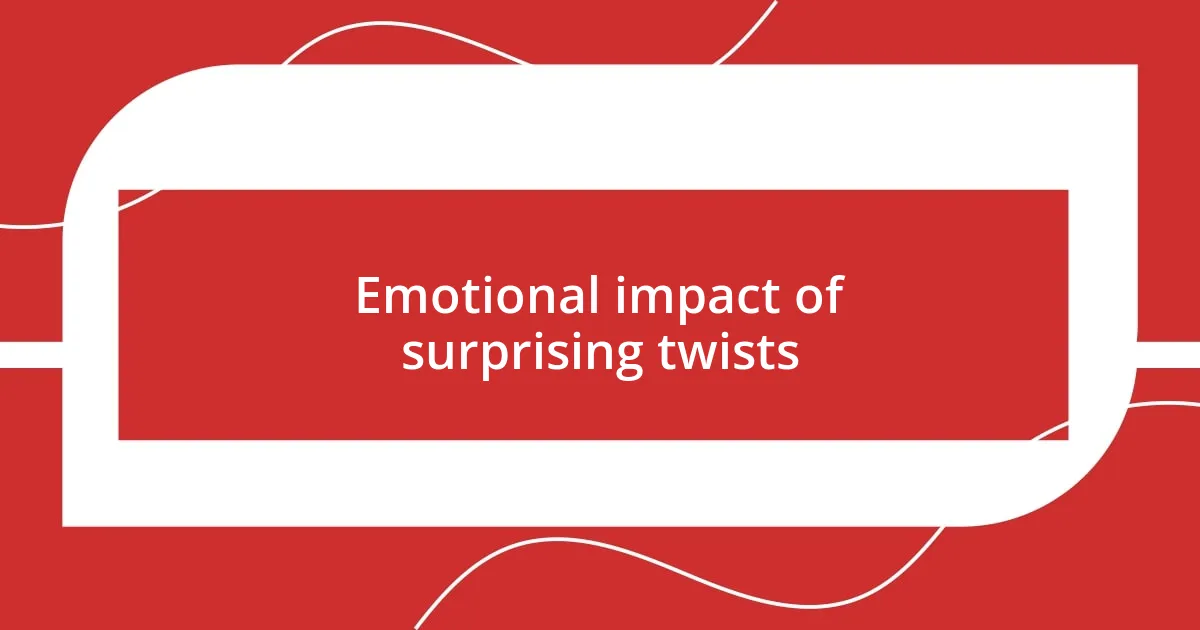
Emotional impact of surprising twists
The emotional impact of surprising twists can be quite profound. I remember watching “Shutter Island” for the first time, and when the twist hit, I felt an overwhelming wave of confusion mixed with heartbreak. It’s fascinating how a well-placed twist can both shatter our expectations and stir our deepest emotions, isn’t it?
Surprising endings often resonate on a more personal level. For instance, in “The Sixth Sense,” the revelation not only shocked me but also left me contemplating the fragility of life and the burdens we carry. It’s as if the twist held a mirror to my own experiences, prompting me to reflect on how well we truly know those around us. Such moments can transform a simple movie-watching experience into a deeply reflective journey.
Moreover, the nuances of how these twists unfold can dictate their emotional potency. I’ll never forget the moment in “Oldboy” when the truth was unveiled; it felt like a gut punch that lingered long after the credits rolled. In these instances, the emotional resonance isn’t just about shock; it’s about the layers of understanding that unravel as we process what we’ve just witnessed. Have you experienced that rush of clarity and confusion simultaneously? It’s a complex but thrilling ride!
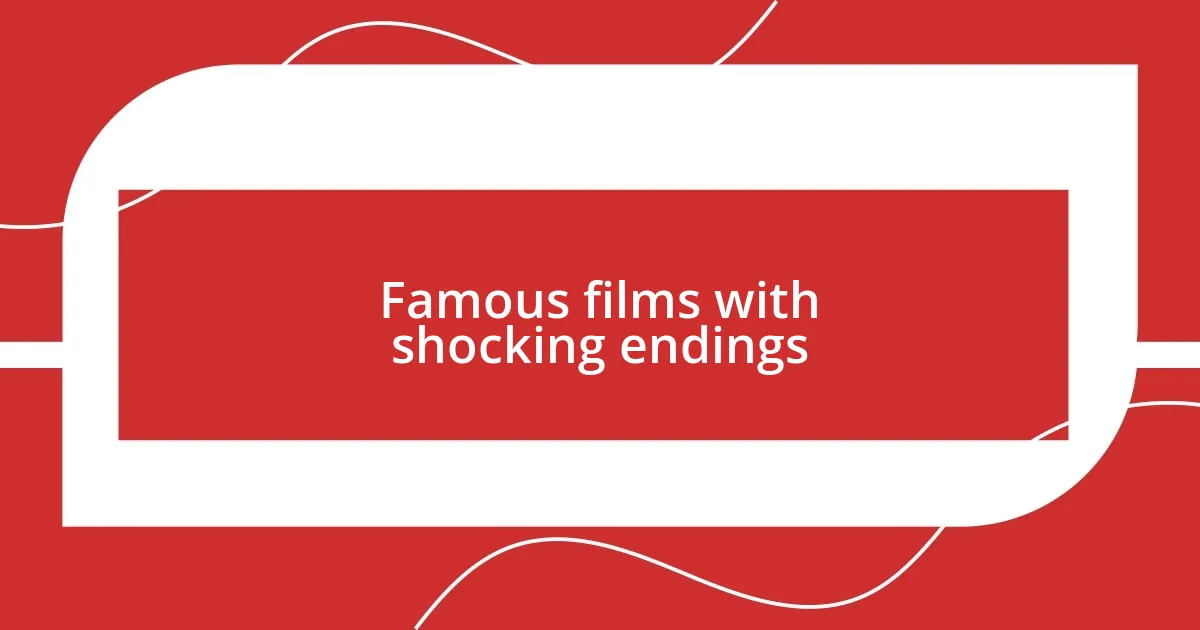
Famous films with shocking endings
When discussing famous films with shocking endings, “Fight Club” comes to mind. The moment the protagonist realizes he’s been living a dual life was a revelation that shook my perception of identity itself. It’s as if I was forced to confront my own inner turmoil about conformity and rebellion, and I couldn’t help but wonder, how many of us wear a mask every day?
Another film that still lingers in my mind is “The Usual Suspects.” The twist at the end caught me off guard, forcing me to reconsider every character’s role from the very beginning. I remember feeling a rush of excitement as pieces of the puzzle clicked into place – it was like a thrilling game of chess where the final move changed everything. Have you ever watched a film that turned your expectations upside down? I think that’s the beauty of storytelling; it can reshape our reality in mere moments.
Lastly, I’d be remiss not to mention “Seven.” The haunting climax makes you question not just the characters but also your sense of justice. I remember watching the credits roll in stunned silence, grappling with the impact of what I had just witnessed. It’s hard not to reflect on what motivates our actions in life after experiencing an ending that feels so unsettling yet profoundly real. Don’t you find it remarkable how a film can evoke such raw introspection?
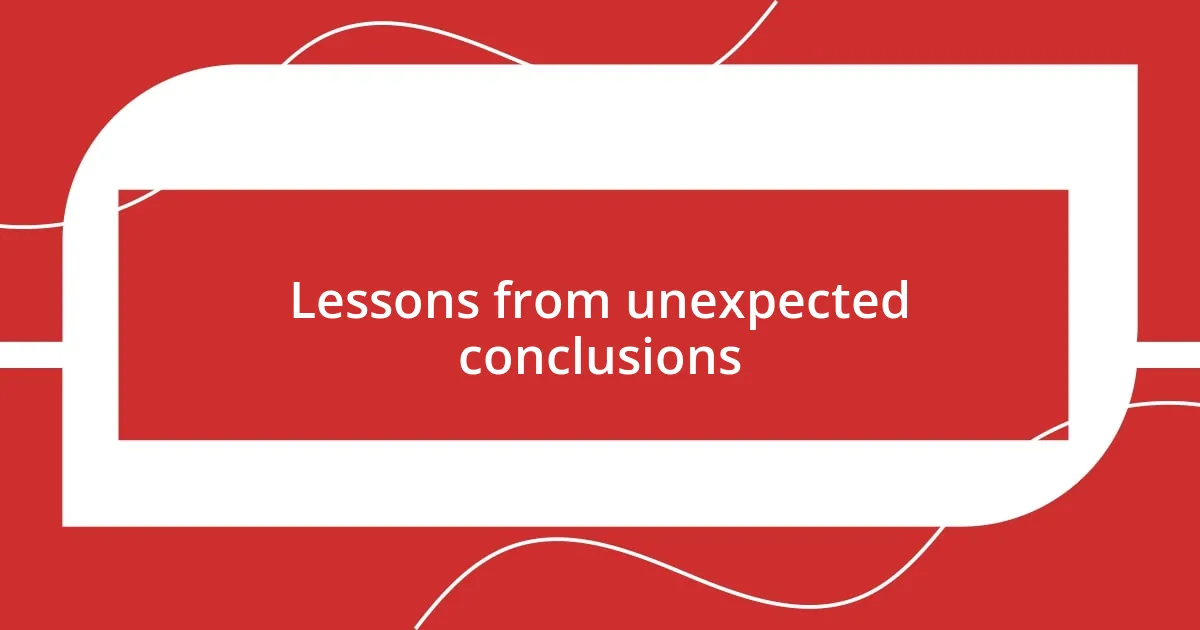
Lessons from unexpected conclusions
There’s a unique power in unexpected movie endings that often leads to profound insights. I once watched “The Others,” a film that redefined my understanding of perspective. In that moment of revelation, I realized how easily we can misinterpret situations in our own lives. The film taught me to evaluate not just the obvious but the hidden layers beneath the surface. How often do we truly see things for what they are?
Unexpected conclusions can also foster a greater appreciation for storytelling. After viewing “Memento,” I found myself questioning how I piece together my own memories. The film’s structure forced me to confront the reliability of my perceptions. Isn’t it intriguing how a twist can shift our understanding and drive self-discovery? This realization lingered with me long after the movie ended, encouraging a deeper engagement with narratives that challenge us.
Moreover, the lessons learned from these twists often extend beyond the screen. When I finished watching “Primal Fear,” I couldn’t help but reflect on the complexities of trust and betrayal in my own relationships. The emotional turmoil echoed my internal dilemmas about loyalty and understanding others’ motives. Have you ever walked away from a film feeling that your worldview had expanded? It’s these unexpected endings that encourage us to explore our thoughts and feelings, prompting valuable life lessons that resonate beyond entertainment.
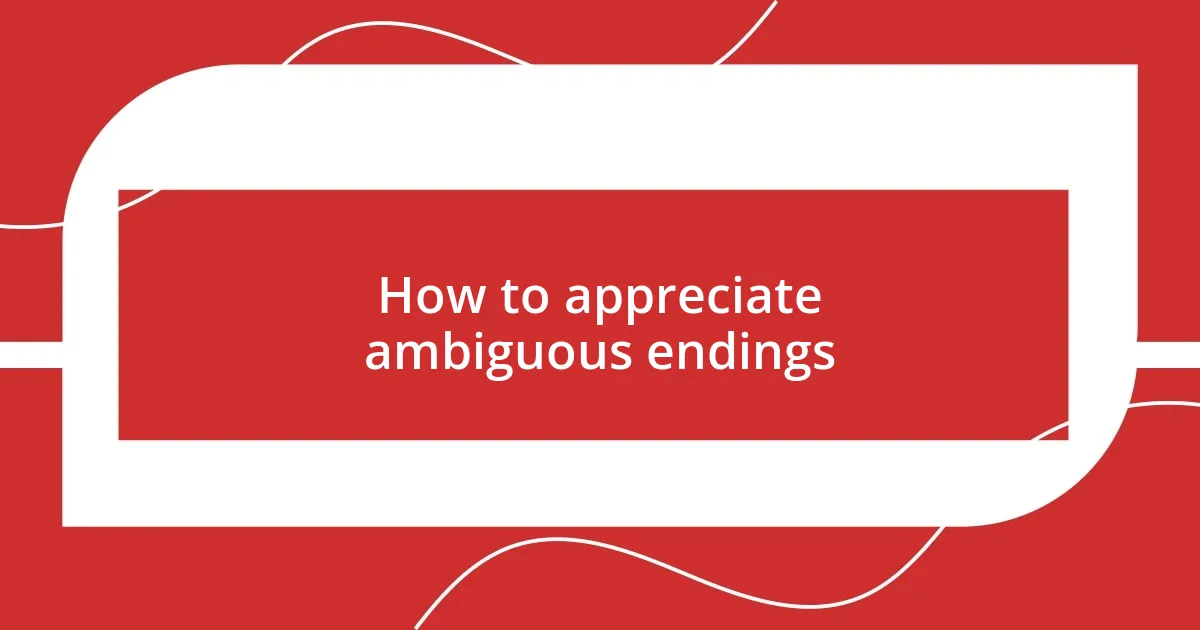
How to appreciate ambiguous endings
Appreciating ambiguous endings requires a shift in perspective. I remember watching “Inception” and feeling my mind race with possibilities long after the credits rolled. The lack of a clear answer left me pondering the nature of reality and dreams, nudging me to consider how often we encounter ambiguity in our own lives. Doesn’t it feel liberating to embrace uncertainty instead of seeking closure?
It’s essential to recognize that ambiguity can evoke powerful emotions. For instance, after seeing “Birdman,” I found myself captivated by its exploration of identity and purpose. The film concluded in a way that didn’t tie everything up neatly, mirroring the unpredictable journey of life itself. I realized that sometimes ambiguity reflects our own complexities; perhaps that’s where true beauty lies. Have you ever felt an ending resonating with your own experiences in such a profound way?
Engaging with these uncertain endings encourages us to derive personal meanings. I once finished “The Lobster” and found myself lost in thought about love and societal expectations. The film’s surreal narrative defied convention, and instead of feeling frustrated, I felt a sense of liberation. It challenged me to rethink relationships, pushing me to ask what love really means in a world rife with rules. Isn’t it fascinating how a lack of resolution can lead us to deeper reflections on our lives and beliefs?
